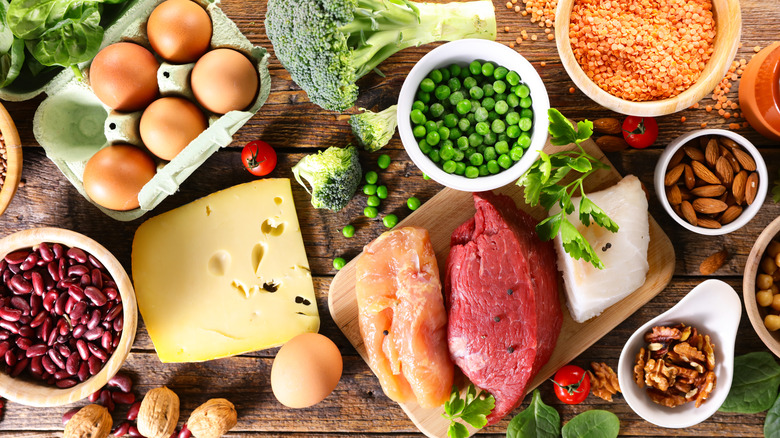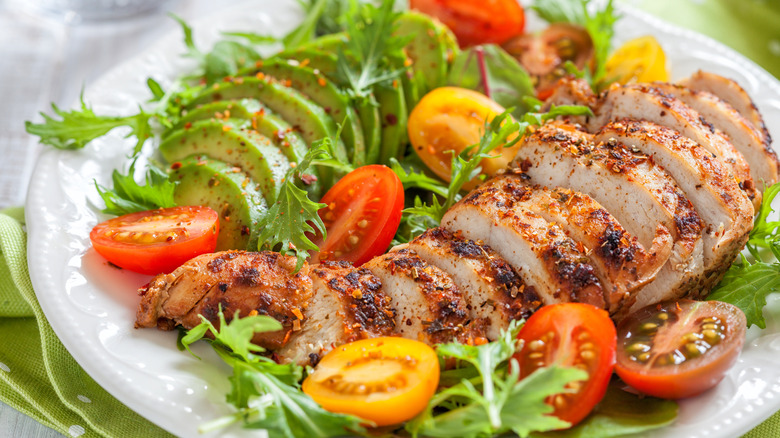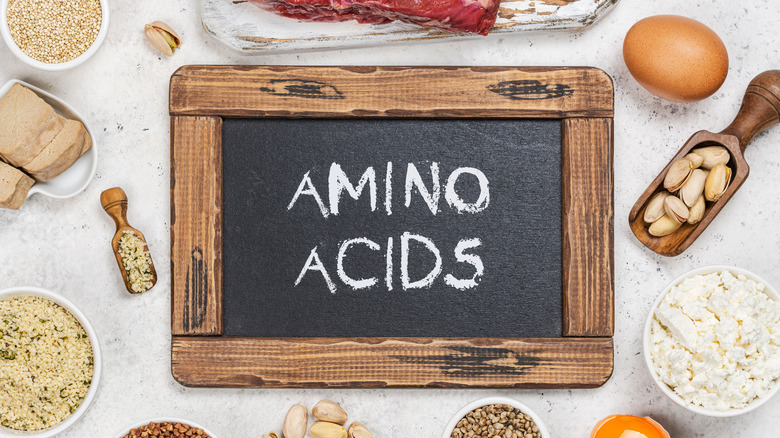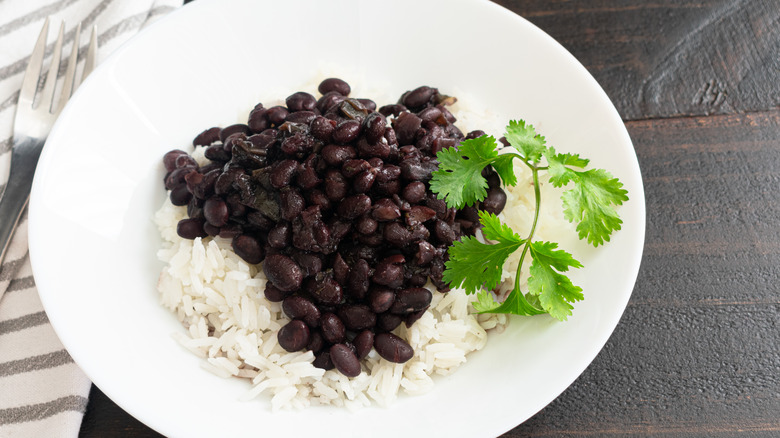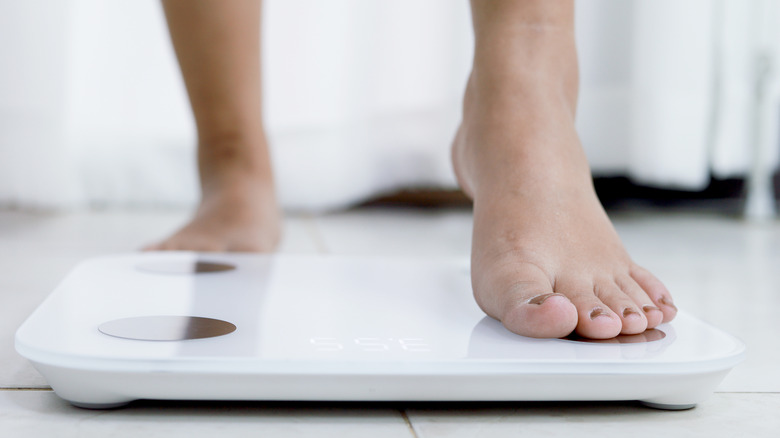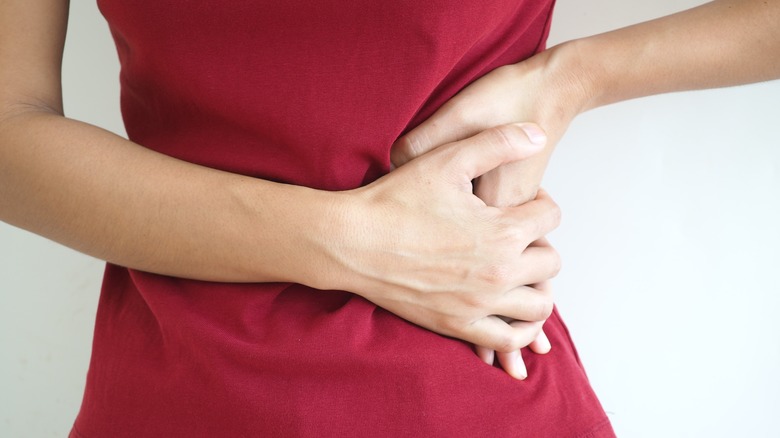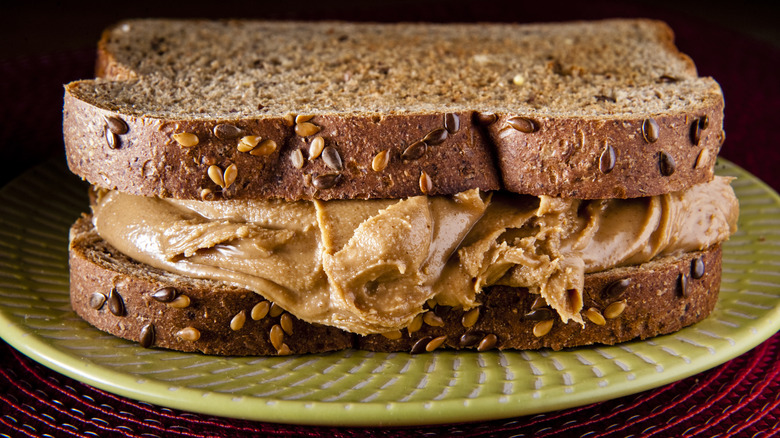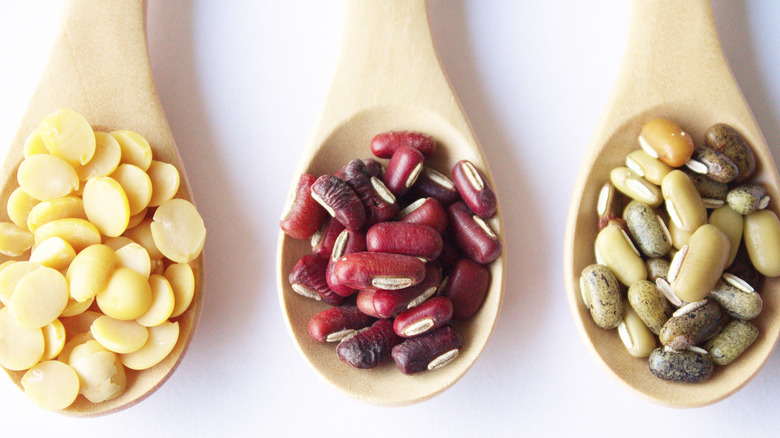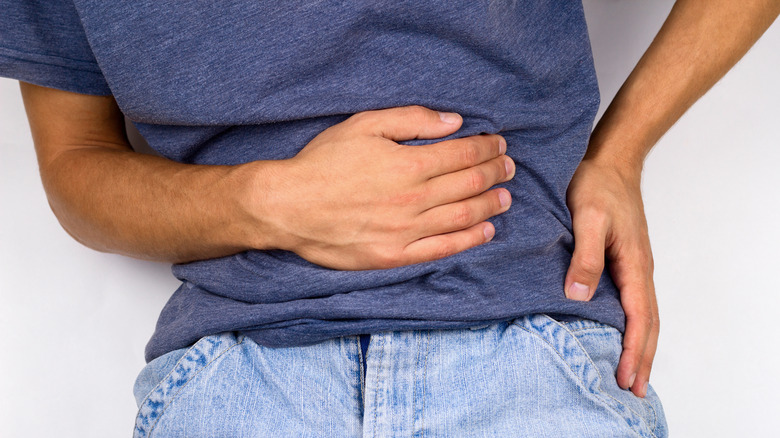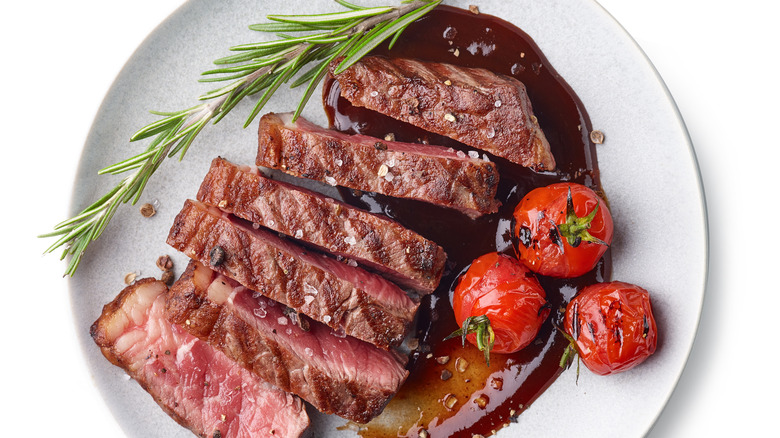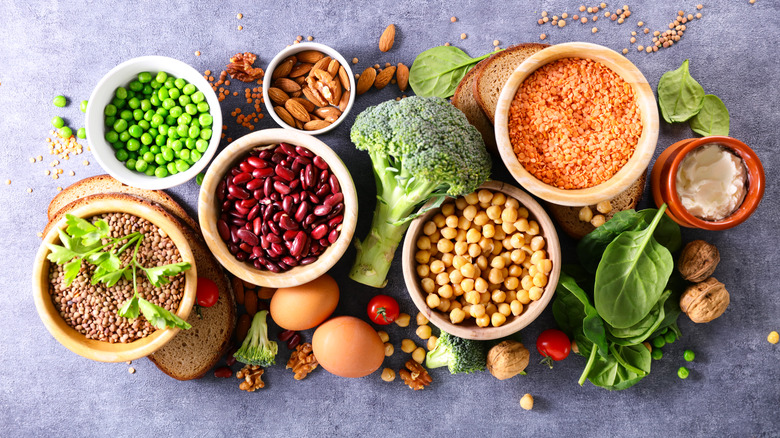Everything You Wanted To Know About Protein
Protein — you hear about it all the time. Pick up any health magazine and you'll see articles touting the benefits of protein, how to get enough protein, or what sources of protein are best. Walk through any grocery store aisle and you'll see food labels boasting of high protein, or maybe you'll even see protein bars or protein shakes.
The only problem is that not everyone fully understands what this nutrient is and why it's such an important part of our diets. More importantly, it can be difficult to tell the difference between fact and fiction, or even the difference between sound health advice and a marketing scheme.
So, maybe it's time to buff up your knowledge of protein, including how your body uses it and what sources of it you should include in your diet. Luckily, here at Health Digest we've pulled together everything you need to know about protein.
Everything in your body is built from protein
You might associate protein with strength, and there's a good reason for that association — protein is what your body uses to build muscle (via LiveScience). But it's not just muscle that your body builds with protein. Healthline explains that protein is also used for repairing pretty much everything in your body, including organ tissue, your skin, even your hormones. This explains why people depend on protein to help them bulk up, or why parents are encouraged to make sure their children get plenty of protein for healthy growth.
Most people rely on meat as a source of protein, and even though animal sources are high in the amount they offer, there are plenty of plant-based foods that are high in protein too. LiveScience goes on to explain that protein is one of three macronutrients — meaning the nutrients you must consume the most of for healthy function (via MD Anderson) — found in your diet, along with carbohydrates and fat. As a macronutrient, protein yields energy for your body — 4 calories per gram, to be specific.
You should aim to get about 10-35% of your calories from protein
Speaking of macronutrients and how they yield energy, you might be wondering how much of your diet protein-rich foods should represent. How should you balance out your protein consumption with your consumption of carbohydrates and fat? According to the Dietary Guidelines for Americans, you should be getting about 10-35% of your daily calories from protein. Compare that with carbohydrates, which should make up 45-65% of your calories, and fat, which should make up about 20-35% of your calories.
What does this look like from a practical perspective? If you consume about 2,000 calories per day, then somewhere between 200 and 700 of those calories should come from protein. Most people need about 5 ½ ounces of protein a day, according to the Dietary Guidelines. Healthline points out that protein's Reference Daily Intake (RDI) calls for women to get 46 grams of protein and for men to get 56 grams.
There are complete proteins and incomplete proteins
Did you know that not all sources of protein are equal, at least in terms of how your body uses them? It's true. Protein is made up of amino acids, and although your body can produce some amino acids on its own, there are nine amino acids that it can't (via Medline Plus). These amino acids are known as essential amino acids because you have to get them from your diet.
When you're getting your protein from an animal source, such as a serving of beef, chicken, milk, or eggs, you're getting protein made up of all the essential amino acids. However, when you're getting protein from a plant-based source, such as beans or grains, then you probably aren't getting all essential amino acids. Does this mean that those sources of protein aren't worthwhile? Not at all — it just means you have to mix and match those plant-based sources so that you're getting all the essential amino acids that your body needs.
Getting your protein from a variety of sources is a good choice
Knowing that animal sources of protein are a complete source of all essential amino acids might make you more inclined to rely on meat and dairy as your primary sources of protein — but this might not be the best choice as far as your health goes. In fact, most health guidelines, such as those from the USDA My Plate, encourage you to vary your sources of protein.
As the American Diabetes Association explains, foods that serve as protein sources also have other nutrients that you need to balance out. Animal sources tend to be high in fat, particularly saturated fat, which could be detrimental to people with heart disease. On the other hand, many plant-based sources of protein are also starchy, and their carbohydrate content might be a point of concern for people who are trying to manage their diabetes. Eating a diet with varied sources of protein will also help ensure you get plenty of other nutrients, including vitamins and minerals, that you need for good health.
Protein can help you maintain a healthy weight
It turns out that protein can be a pretty key part of a having a healthy body composition, whether you're trying to maintain a healthy weight or trying to lose some pounds, according to Women's Health. That might come as a surprise — after all, most of the low-calorie foods you associate with losing weight, such as fruits and vegetables, are low in protein, whereas the first foods you might be inclined to restrict when you're on a diet, such as meat and dairy, are high in protein. So what's the deal?
Well, Women's Health explains that while restrictive diets often cut high-protein foods, these limitations tend to make it difficult for people to keep up with those diets in the long term. Additionally, protein helps you feel and stay full, so it can be helpful in stopping you from overeating.
But maybe the most important reason that protein is a net positive for weight control is that it helps you maintain muscle mass, which is good for keeping up your metabolic rate. Protein also tends to take more energy to digest than other macronutrients. In other words, even though high-protein foods have more calories than an apple or a carrot, they also require more calories for your body to break them down.
But high-protein diets aren't always ideal
"Wow," you might be thinking, "if high-protein diets are good for maintaining a healthy weight, then sign me up. Pass the bacon, please." Unfortunately, this might not be the ideal dietary choice for your health, as the Mayo Clinic explains.
When you make protein the primary focus of your diet, you will very likely end up getting insufficient amounts of other nutrients — such as complex carbohydrates, which are your body's preferred source of energy — as well as fiber for good digestion and many vitamins and minerals you need for proper function. Without these healthy carbohydrates, vitamins, and minerals, you could end up constipated or suffering terrible headaches — in other words, not exactly feeling your best.
A high-protein diet can also put you at risk of chronic diseases. High protein intake is hard on your kidneys and often leads to poor kidney function or even kidney disease. Additionally, it's important to remember that many high-protein foods, such as meat and dairy, also tend to be high in saturated fat, making them bad for heart health if consumed in too large of quantities.
Athletes often need more protein than other people
While excessive protein consumption isn't a great idea, there are some people who could benefit by boosting their protein intake a little bit. Case in point: athletes or other physically active individuals. As Men's Health reports, studies show that increasing your protein consumption can prevent your body from fueling itself by burning muscle during intense exercise — something that's essential if you want to train hard and get stronger.
It's important, however, not to go overboard. Protein is necessary for repairing muscle damage that comes with exercise, but many people (including athletes) estimate their protein needs to be much higher than they are, according to the Academy of Nutrition and Dietetics. Athletes should aim to get about 1.2 to 2 grams of protein per kilogram of bodyweight every day, and they should make sure they're also getting sufficient amounts of carbohydrates and fat too.
Your body can absorb only so much protein in one sitting
There's another thing that people should keep in mind about protein and overconsumption, particularly athletes who think that scarfing down 50 grams of protein after a hard workout is going to be beneficial for them. Unfortunately, your body can use only so much protein at a time. The bodily process of using protein is called protein synthesis, according to Men's Health. This is when your body uses protein to repair tissue, such as the muscles you break down during a tough workout. When protein is synthesized to repair those muscles, they grow back bigger and stronger. Any less than 25 grams could leave your muscles not fully recovered. But any more than 30 or 35 grams of protein isn't going to get used — at least not for protein synthesis.
So even though it seems like a great idea to pack away as much protein as you possibly can after working out, there's really no point to getting more than 30 grams of high-quality protein at each meal. Instead of consuming excessive amounts of protein all at once, aim to space your intake of protein throughout the day.
You don't have to consume protein immediately after a workout
There's another misunderstanding about protein that permeates the fitness community. Many athletes and active individuals have been fed bad advice not only about how much protein they should be eating, but also about when they should be eating it. Some people believe that they need to have protein immediately after a workout — maybe as quickly as 15 minutes after they finish exercising, but definitely within an hour of finishing exercise, right?
But Livestrong explains that this isn't exactly the case. The notion of needing to consume protein before too much time has passed — known as the "optimal window" of times to consume post-workout protein — is all based on theory. Instead, it's important to remember that the anabolic benefits of exercise will hold out for about a day (that is, a full 24 hours). Therefore, as long as you're getting sufficient protein throughout the day, you'll be giving your body what it needs to repair itself after exercise and grow stronger.
You don't have to pair incomplete proteins together at the same meal
Here's a situation to consider: You're varying your sources of protein, and you're eating a sufficient amount at regular intervals throughout the day. But if you're eating those plant-based sources of protein that are incomplete — that is, they don't have the full chain of essential amino acids — does that mean you have to eat complementary proteins at every meal? In other words, do you have to have different sources of protein so that you get all nine essential amino acids at the same time?
This used to be the commonly accepted way of doing things, but now experts are realizing that this pairing isn't necessary (via LiveScience). Instead, it's just important to get all nine essential amino acids from a variety of protein sources throughout the day or throughout the week. If you enjoy food like beans with rice or peanut butter with whole-grain bread, then go for it — these are great meals where, thanks to complementary foods, all nine essential amino acids are represented. But if you'd rather have the whole-grain bread at lunch and the peanut butter as a snack later in the day, you could totally do that and still reap the benefits.
Protein powders can help you supplement your diet
If your diet is lacking in protein, or if you have increased protein needs, you might be interested in checking out a supplementary protein powder to give your diet a little bit extra. While it's always best to get nutrients like protein from whole food sources, it's sometimes helpful to depend on a supplement. Such situations might include when you won't have a chance to eat a real meal after a workout, or when you're trying to consume more protein without overeating.
In these situations, it's smart to be informed about the supplement you're choosing. Men's Health explains that different protein supplements vary based on the amount of protein, fat, and carbohydrates included in each serving. A person who is going low carb in an effort to lose weight might choose to avoid any protein powder with carbohydrates (such as those with added sugars for a boost of sweetness). However, those carbohydrates could be beneficial for a person who is fueling themselves through an athletic practice. Your best bet is to read the label and consider what your specific needs are.
A high-protein diet can make you constipated
If you're eating a high-protein diet, you might find yourself struggling with a bout of constipation. This is due to a combination of what your diet has in excess (probably meat and dairy products) and what your diet is lacking (that is, fiber), as Women's Health explains. Most high-protein foods tend to be low in fiber, whereas fibrous foods are more likely to be high in carbs and low in protein. Therefore, if you've cut out broccoli and sweet potatoes in favor of beef and whey concentrate protein powder, your digestive health is going to suffer.
You could, on the other hand, also have the opposite problem. Many protein supplements tend to be high in artificial sweeteners that cause gas and diarrhea. Some people are also sensitive to dairy products, so they could suffer gastrointestinal distress from consuming whey protein.
This is one more reason it's important to make sure your protein consumption is in keeping with a balanced, varied diet — one with plenty of fruits and vegetables that will ensure you have healthy digestion.
When it comes to animal sources, red meat has its drawbacks
When you hear the word "meat," what comes to mind? Harvard School of Public Health explains that most people consider "meat" to be red meat and differentiate it from other animal products like poultry and fish. This distinction can be important when it comes to protein recommendations because red meat carries much greater health risks compared with other animal products. Although red meat is packed with protein and other nutrients like iron, it is also high in saturated fat and cholesterol, which, when consumed in excess, can put a person at risk for long-term chronic health conditions like heart disease.
This doesn't mean that you have to cut red meat out of your diet entirely — Harvard recommends just finding creative ways to reduce your consumption, such as by replacing red meat with chicken or fish. You can also opt to eat plant-based sources of protein instead.
Plant-based sources of protein are abundant
It's great to read things like "vary your protein sources" and "you can complement plant-based proteins to make sure you're getting all your amino acids," but maybe you're still left wondering what foods out there have protein besides meat, poultry, and seafood.
The reality is that there are plenty of protein sources that come straight from the earth — no animals required! Healthline explains that whole grains, vegetables, beans, legumes, nuts, and seeds are all great sources of protein. And when you compare them to animal sources, some of them have more protein per calorie than meat. You'll probably notice that many plant-based sources of protein are also great sources of complex carbohydrates, fiber, vitamins, minerals, and antioxidants, making these great choices to incorporate for your overall health. If you're looking to try plant-based protein, consider adding quinoa, almonds, Brussels sprouts, broccoli, peanuts, oats, lentils, or Ezekiel bread to your diet.

